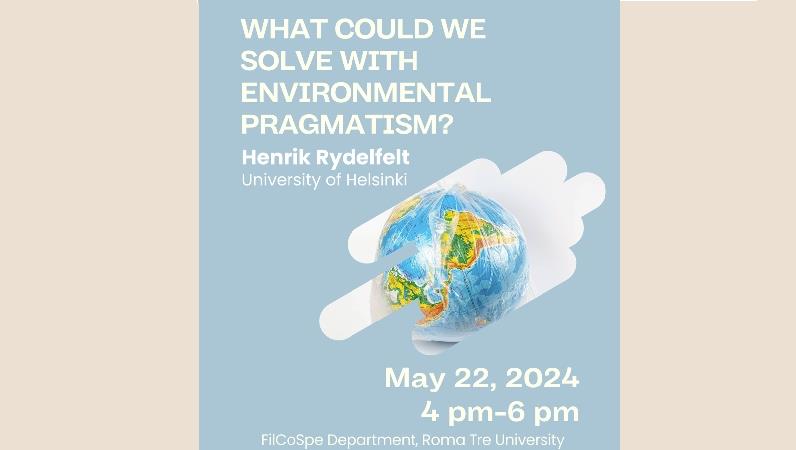Mercoledì 22 maggio alle ore 16:00 presso l’aula 23 di FilCoSpe (Via Ostiense, 234), Henrik Rydenfelt (University of Helsinki) terrà una lezione seminariale su “What Could We Solve with Environmental Pragmatism?”
Qui di seguito l’abstract del suo intervento.
What Does Environmental Pragmatism Solve?
Henrik Rydenfelt (University of Helsinki)
Environmental pragmatism comes in numerous shapes. It was originally conceived as a practical approach for integrating environmental philosophy into policy-making, addressing the incentives of various stakeholders without becoming entangled in philosophical intricacies. However, this approach faces several challenges in the eyes of critics. It leads to a rudimentary instrumentalism where values are merely tools for achieving efficiency. It fails to address the question of ultimate values, bypassing central issues of ethics. By basing its proposals on the current values, problems and motivations of people and institutions, it risks endorsing practices that are environmentally damaging. Conversely, by prioritizing efficiency, it may support practices that are effective yet ethically questionable. Moreover, its association with pluralism has been argued to border on relativism and subjectivism.
I argue that these issues may be overcome by adopting, in environmental philosophy, the central pragmatist insight that values, or ends in view, may be revised in light of experience. Experience does not merely deepen our understanding of our existing values or ethical theories but prompts ongoing reevaluation and modification of our ethical theories and perspectives. While such pragmatism does not promise quick "solutions", it offers a robust understanding of environmental philosophers as facilitators of the revision of actual values and policies. Using climate change as an example, I reflect on potential tasks of environmental pragmatists in processes of solving intricate environmental issues in terms of a number of interesting tasks, including the articulation of the consequences of existing valuations to prompt (what Dewey called) problematic situations; the creation of proposals for new practices and policies revising existing ones; and the continuous reassessment of these policies and practices in light of new outcomes and experiences.
Link identifier #identifier__56749-1Locandina
Lezione seminariale: “What Could We Solve with Environmental Pragmatism?” Henrik Rydenfelt (University of Helsinki) - Dipartimento di Architettura
 Dipartimento di Architettura
Dipartimento di ArchitetturaDipartimento di Architettura dell'Università degli Studi Roma Tre
Department of Architecture
Dipartimento di Architettura dell'Università degli Studi Roma Tre
